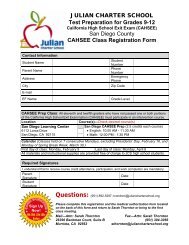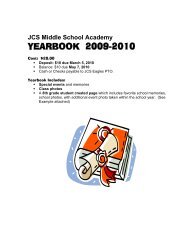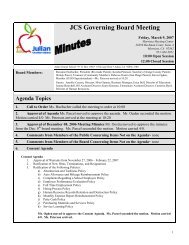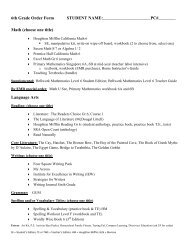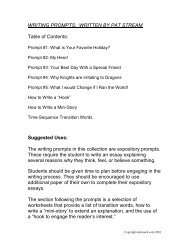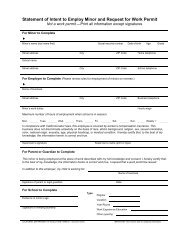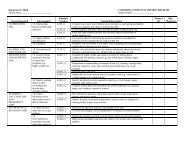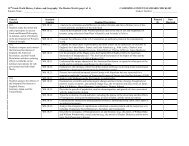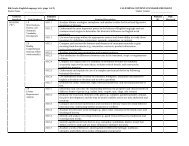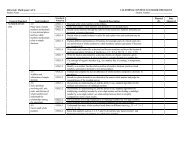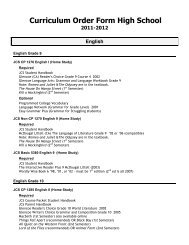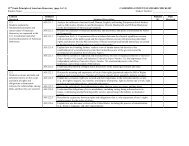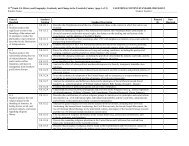2009-2010 Self-Study WASC Action Plan - Julian Charter School
2009-2010 Self-Study WASC Action Plan - Julian Charter School
2009-2010 Self-Study WASC Action Plan - Julian Charter School
You also want an ePaper? Increase the reach of your titles
YUMPU automatically turns print PDFs into web optimized ePapers that Google loves.
• “In danger of failing” notices are sent to home study<br />
parents; academies counsel students not on track.<br />
• Personalized learning program offers flexibility to<br />
meet goals (e.g., make up credit deficiencies).<br />
• Facilitators or advisors/coordinators regularly evaluate<br />
transcripts, assess student progress toward graduation<br />
(and college) requirements, and discuss post-high<br />
school options.<br />
• Facilitators and advisors/site coordinators provide the<br />
first level of support for college-bound students and<br />
their parents to help with course selection, application<br />
process, and the pursuit of scholarships.<br />
• Letters to parents<br />
• Master agreements<br />
• Job descriptions<br />
PERSONAL L EARNING PLAN—FUTURE GOALS<br />
• Middle school and high school settings offer a variety<br />
of transition programs and resources:<br />
• Field trips to colleges, college/career fairs, job shadowing,<br />
guest speakers, and opportunities (SPAWAR<br />
– Girl’s Day Out, Civil Air Patrol) are offered.<br />
• <strong>School</strong> counselors provide information to access<br />
SAT preparation, scholarships, FAFSA, grants, and<br />
community college coursework.<br />
• <strong>School</strong> counselors (and advisors) hold individual<br />
student/parent conferences and community<br />
meetings (grad/college requirements and other<br />
career/college needs).<br />
• Letters and packets are provided for parents and<br />
students that include testing information<br />
graduation requirements versus college prep<br />
requirements, overview of resources available for<br />
college and career searches, etc.<br />
• Math chair counsels middle/high school students<br />
and/or facilitator about next year course options.<br />
• Assessment and self-assessment tools are utilized<br />
across the school to allow student research and<br />
goal-setting, such as: career interest surveys,<br />
COIN3, student learning surveys, ASVAB and life<br />
skills courses.<br />
• Work study, internship programs and access to<br />
career technical elective courses provide high<br />
school students career exploration experience.<br />
• The 7 Habits of Successful Teens, recommended<br />
reading in the Life Skills course, helps teens make<br />
better decisions and improve sense of self-worth.<br />
• Required personal statement essays help students<br />
clarify goals and assist teachers, specialists, and<br />
facilitators better understand each student.<br />
• <strong>School</strong> calendar<br />
• Flyers<br />
• Learning style surveys<br />
• Online student portfolios<br />
(COIN3)<br />
• SMART goal sheets<br />
• Work Experience<br />
Education portfolio and<br />
work experience records<br />
• Course descriptions and<br />
syllabi<br />
• College Board data<br />
• Driver’s Education records<br />
• Handbook<br />
• Workshop agendas<br />
• Transcripts<br />
• Counselor packets/records<br />
• Math chair interview<br />
• EF/parent interviews<br />
• E-mail documentation<br />
Notable Progress:<br />
• Seniors are receiving an<br />
increasing number of<br />
scholarships and awards as<br />
a result of the encouragement<br />
and support offered<br />
by staff and community<br />
Chapter 4: <strong>Self</strong>-<strong>Study</strong> Findings: Curriculum<br />
<strong>Julian</strong> <strong>Charter</strong> <strong>School</strong> Focus on Learning <strong>2009</strong>-<strong>2010</strong> 65



